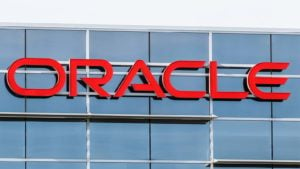Most investors are well aware that the S&P 500 was down 1.6% at the end of April.
However, the ongoing earnings season and the promise of at least one rate cut later in the year have helped stocks keep momentum. Experienced investors are aware of the fact that market ups and downs are common. Simply put, it is just not possible to time the market. Instead, consider this as a time to buy the most undervalued S&P 500 stocks that have the potential to move higher as the economy improves.
These well-known industry players haven’t been able to gain momentum lately. The three stocks are legacy players in their respective sectors and have reported impressive fundamentals. They are meant to skyrocket and if you make your move, you will be able to make the most of their upward journey.
Oracle (ORCL)

Tech giant Oracle (NYSE:ORCL) is known for cloud services in several organizations. Currently, it is a frontrunner in the artificial intelligence (AI) race. As the world’s major database software company, Oracle is building 100 data centers and has partnered with some of the biggest tech companies in the world. It is working with Microsoft (NASDAQ:MSFT) to deliver Oracle cloud infrastructure in Microsoft Azure.
Additionally, it has partnered with Nvidia (NASDAQ:NVDA) to deliver generative AI services for consumers around the world. Oracle’s cloud services will be combined with Nvidia’s generative AI software for consumers to deploy AI factories.
Another recent development is its partnership with Palantir (NYSE:PLTR). Oracle’s cloud software will be combined with Palantir’s leading AI platform to deliver solutions for the government and businesses.
The soaring demand for Palantir’s AI software could benefit Oracle’s cloud segment and it could be a boon for the business. In Q3 results, the company saw a 49% year-over-year (YOY) growth in the cloud infrastructure revenue. So, considering the prominent partnerships, this number could easily rise in the coming quarters.
Also, Oracle is planning to invest $8 billion in cloud and AI infrastructure in Japan over the next decade. Exchanging hands for $117 today, the stock looks highly undervalued. It is moving in the range of $100 to $129 over the last six months. As one of the top tech stocks that could benefit from the growing AI demand, Oracle is a strong buy.
Johnson & Johnson (JNJ)

Healthcare leader Johnson & Johnson (NYSE:JNJ) is down 7% YTD and 8% in the past 12 months. The company saw a big boost in revenue from medical device sales and reported a revenue of $21.4 billion for Q1. Its EPS stood at $2.71, while the medtech segment saw an increase in sales during the quarter and generated sales of $7.82 billion, up 4% YOY.
Johnson & Johnson steadily expands its business through acquisitions. And, it recently announced the acquisition of Shockwave Medical for $13.10 billion. Also, JNJ bought Abiomed for $16.60 billion in 2022.
Unfortunately, the company’s lawsuit problems haven’t gone away, which may have impacted the financials. Trading at $148 today, the stock is undervalued and considered a long-term buy and hold. So close to the 52-week low of $143, buy this dip while you have the chance.
Compared to the healthcare industry average, the stock is trading at a discount. A dividend stock, JNJ has paid dividends for the past 62 years and increased the dividend by 4.2% to $1.24 in the recent quarter.
One thing to remember is that JNJ may face ups and downs but it will never go out of business. Thus, its massive umbrella of pharmaceuticals and medical devices will help the business thrive over the years.
PayPal (PYPL)

Fintech company PayPal (NASDAQ:PYPL) is trading at $63 today. The stock is up 7% year-to-date (YTD) and is moving in the range of $56 to $67 since the beginning of the year.
The company reported impressive financials with a revenue of $7.7 billion, up 10% YOY, and the EPS increased 27% to $1.08. Its total payment volume was up 14% to $403.9 billion. The management lifted the profit forecast for the year and now expects it to increase by a “mid-to-high single-digit percentage”.
Despite reporting a strong quarter, PYPL stock only rose 3%. Considering the high inflationary environment and low consumer spending, the costs impacted PayPal’s margins. Catering to over 400 million users, PayPal’s comeback was inevitable. It showed the ability to attract and retain customers with high user engagement and improved revenue growth.
Truly, PayPal is one of the best fintech stocks to own right now. Trading at a reasonable price, and as the digital payments industry expands, it will see higher users and payment volume. It is a well-established business and one of the largest industry players. Therefore, the future looks bright for this growth stock.
On the date of publication, Vandita Jadeja did not hold (either directly or indirectly) any positions in the securities mentioned in this article. The opinions expressed in this article are those of the writer, subject to the InvestorPlace.com Publishing Guidelines.
